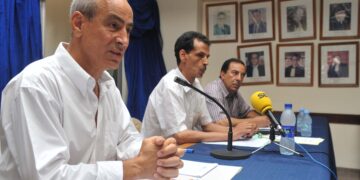11 Jordanian Hirak Activists Arrested, Others Banned from Social Media by Court Decision, in Attack on Critics
(March 4, 2022, Washington D.C.) – The arrest and prosecution of 11 Jordanian "Hirak" reform activists over the past two weeks, as well as a court-ordered ban on social media use by Alaa Al Fazaa, a Jordanian activist living in exile, are the Jordanian government's latest efforts to weaponize its judiciary and laws to persecute critics, said Democracy for the Arab World Now (DAWN).
The U.S. government should reprogram its reform assistance to civil society groups outside the control of, and with no affiliation to, the government or royal family that can independently and credibly monitor abuses and advocate for change.
"It's bad enough that the U.S. government is providing billions in military assistance over years to an unelected, unaccountable monarch; it reaches the level of farce when the U.S. provides millions ostensibly for judicial reform while the monarchy uses its courts as a tool of repression," said Sarah Leah Whitson, Executive Director of DAWN. "Not another dime should go from U.S. taxpayers to the Jordanian government if it persists in using our support to finance the King's political repression."
In the late evening of February 13, Jordanian security forces detained nine "Hirak" reform activists from their homes, and detained another activist on February 14 from his workplace in Zarqa. They also arrested an eleventh activist, Ahmad Neimat, on February 24 after he posted bail for one of the detainees, Abed Tawahie, a 65 year old engineering professor, but arrested Tawahie again on February 25. All of the detainees are activists in local Hirak activist groups, which have been protesting the government's economic policies and calling for democratic reforms for over ten years. DAWN spoke to ten local activists, witnesses and lawyers between February 18 and 28 to ascertain information about the arrests and prosecutions. Detailed information about the detained activists is provided below.
The Hirak movement has no political affiliation or stated ideology, but is a loose association of activists in cities across Jordan. Hirak-associated groups started local protests outside of Amman in May 2011 as a counter to efforts of Jordanian security forces to infiltrate and attack protesters by recruiting and mobilizing thugs; this is what reportedly happened on March 25, 2011, when the government recruited hundreds of men and brought them by buses from different peripheral cities and towns in Jordan to attack protesters at Amman's Al-Dakhiliyah Circle who were demanding democratic reforms at the height of the Arab Spring uprisings.
The recent wave of arrests targeted two active Hirak groups, Hirak Al-Salt, from a central city in Jordan's midwest, and Hirak Bani Hassan, from Zarqa, in the mideast, and Mafrak, in the northeast of the country. Security forces have held the detainees, who range in age from 27 to 65, and include engineers, public employees, athletes, web designers, and veterans at Moqar, Qafqafa (Irbid), Marka (Amman), Um al Lolo (Irbid), Tefilla, Karak, and Salt prisons. These prisons are all but in one case at least 100 kilometers away from their homes and families. All but one of the men are married with children. The government has sent the men to prisons far from their families "to absorb and weaken their social support by making it difficult for their families and their lawyers to visit them," explained one activist who asked his name to be kept confidential. Detainee representatives told DAWN that they have experienced years of government-orchestrated persecution for their activism, including multiple prior arrests and employment bans.
Representatives of the detainees told DAWN that one detainee has contracted the Corona virus during his imprisonment. Medical care and access to medicine in the prisons has been inadequate, complained family members of the detainees.
The government prosecutor has charged each of the men individually with identical, broad and vaguely defined charges of "spreading false news" under article 15 of the country's Cybercrime Prevention Law and "inciting strife" under article 150 of the Penal Code. They have also charged Al-Khalaileh and Al-Zyeud, two of the Bani Hasan Hirak members, with "insulting a higher entity." The men face prison terms for these felony charges of six to 27 months if convicted.
The prosecutor has failed to provide the factual basis for charging the men with these crimes. Asem Omari, a lawyer defending the detainees, said, "It is a common practice to delay the release of the case files, which precisely identify the facts they are using to justify their charges." Representatives of the detainees have stated that the men have no idea why the government has chosen to arrest and prosecute them at this time.
"Jordan is weaponizing the country's laws and judiciary by summarily using a terrible law that criminalizes free speech to label it as 'false information' and then using servile judges to rubber stamp guilty verdicts," said Jamal al-Tahat, a special adviser at DAWN. "And as long as the government uses its judiciary for the dirty work of jailing government critics, no one will take claims of judicial reform seriously, however much money the U.S. spends on such pretend reforms."
The government is deliberately charging the men individually and not as a group as a "depletion tactic", explained one lawyer, Malik Abu Orabi, increasing the burden and cost of the activists to defend themselves. "Dealing with ten cases means more money and more effort," the lawyer explained.
The men appeared before the civil court in Amman on February 23, in simultaneous hearings, requiring ten lawyers to represent each detainee in each case. At the hearings, the police formally remanded them to the court. On March 2, Judge Abdul Al-Halleem Hyasat, in Amman court retreated from calling the prosecutor's witnesses about the charges attributed to Adel Falah al Zeyud, who is charged according to the article 15 of the Cybercrime law. The lawyer of al-Zeyud, retired Judge Loai Obidat, registered a case against the security department because they had arrested his client al-Zeyud without prior approval from the prosecutor.
During the arrests on February 13 and 14, dozens of policemen accompanied by specially-equipped "anti-terrorism" security forces arrived at the homes of nine of the detainees and at the workplace of one of the detainees, in a heavy-handed operation that was captured on videos by witnesses. The videos show security detainees roughly treating family members of the detainees, including their wives and children. In one video, an elderly father of one of the detainees is seen verbally protesting the arrest operation.
In another unprecedented attack on a Jordanian critic, Judge Mohamad Tarawneh issued an order against Alaa Al-Fazaa banning his Facebook account in a hearing in a district court. Judge Tarawneh issued the verdict against Tarawneh in absentia on December 26, 2019 (case number 21232/2019). It was the first time that a court in Jordan banned a Facebook page. Although the government is not in a position to force Facebook or Twitter to shut down this activist's accounts, they have apparently complied with the Jordanian government's request to suspend his accounts, which he is appealing.
For the past five years, the U.S. government has provided Jordan with an annual package of $425 million in military aid and $1.08 billion dollars in economic aid. Though the Jordanian monarchy has promised to implement constitutional reforms to democratize the country and transfer power to the elected parliament, the King has made none of the promised reforms, and instead only further centralized his executive powers, including unchecked power over the military and security sectors, with the passage of recent constitutional amendments in 2014 and 2022.
"The reality is that far too much of the U.S. government's aid for political reform goes to government and monarchy-affiliated organizations that will never actually try to reform anything because their bread is buttered by the King," said al-Tahat. "The U.S. government needs to take a close hard look at who it's sending aid money to and whether they have any credibility as agents for change in Jordan."
Details Regarding Arrests and Prosecution of Hirak Activists, February 2022
Name | Age | Profession | Current Prison | Residence | Notes |
|---|---|---|---|---|---|
From Bani Hasan Hirak | |||||
Abdullah Al-Sabeeh Khawaldehl | 38 | Web Designer | Moqar150KM | Mafraq | Arrested 3 timesMarried with four childrenStarted a hunger strike last week |
Ibrahim Abdul Lateef al-Khalaileh | 47 | Clerk in the Municipality Council | Moqar 1150KM | Zarqa | Arrested 15 timesMarried with four childrenStarted a hunger strike last week |
Adel Falah al-Zyeud | 39 | Operational Manager in a power company | Qafqafa/Irbid100KM | Zarqa | Arrested multiple timesMarried with three children |
Imad Bakheit al-Khalaileh | 36 | Qafkafa | Zarqa | Arrested more than three times | |
Abdullah (ali Aqeel) al-KhalailehAbo Sayel | 47 | Bodybuilder/ Trainer | Marka, Amman50KM | Zarqa | Arrested more than five timesMarried with four children |
From Salt Hirak | |||||
Ahmad Abdullah Hiary | 43 | Communication Engineer | Salt | Arrested twiceMarried with two children | |
Salem Abu-Snober Ak-Abadi | 45 | Clerk at Balqa University | Irbid, Um al Lolo100KM | Salt | Arrested more than three times |
Abed Khalifa T Tawahieh | 65 | Power Engineering Professor at a university | Karak220KMTefilla300KM(After second arrest) | Salt | Was released after fourteen days then arrested againMarried with six children |
Oday Abu Rumman | 38 | Retired from the army | Salt | Salt | He did not attend the court hearingMarried with four children |
Ahmad Abedull Hameed Al-Hiary | 27 | Works in agriculture | Um al Lolo, Irbid100KM | Salt | Second time arrestedBegan a hunger strike on February 16 |
Ahmad Neimat Al-Abadi | 38 | Self-employed | Married with two children |







































